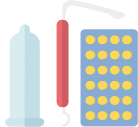Emergency Contraception

Emergency contraception is used for preventing pregnancy when there has been unprotected sex (no contraception) or a contraceptive failure (missed pill or split condom). It is sometimes referred to as the ‘morning after pill’.
Emergency contraception is provided by all our clinics and is free. The nurse or doctor you see will assess the best type of emergency contraception for you. You may be offered a copper coil (IUD) or a tablet depending on your situation and your preference. We will always discuss and offer future contraception.
Some clinic locations may not be able to provide a copper coil, but we will always try our best to get you seen by another clinic location if you wish to go ahead with the copper coil (IUD). If the copper coil cannot be fitted
immediately, you may be advised to take an emergency contraceptive pill.
It is always best to get emergency contraception as soon as possible, so we advise you get emergency contraception in the first instance from:
-Your GP
-A pharmacy; some may offer this free if you are under 25
-An NHS walk in centre
Below are the emergency contraception options available to you.
Emergency Contraception Options
Emergency IUD (Copper coil)
The IUD is a small plastic and copper device that's fitted in your womb up to 5 days (120 hours) after unprotected sex or within 5 days of the earliest time you could've released an egg.
The IUD is the most effective method of emergency contraception. If it can't be fitted immediately, you may be advised to take an emergency contraceptive pill.
Advantages:
-Highly effective
-Non-hormonal
-Suitable for most people
Disadvantages:
-Short procedure can be uncomfortable
-May make periods heavier and longer
-Does not protect against STI's
Emergency Contraceptive Pill (EllaOne)
EllaOne is a tablet which contains ulipristal acetate. It is more effective at preventing pregnancy than a pill with levornorgestrel.
You will be given 1 pill to take, it should be taken within 5 days (120 hours) of having unprotected sex but it should ideally be taken as soon as possible.
Advantages:
-Oral tablet
-More effective than levornorgestrel pill
-Can be used up to 120 hours after unprotected sex
Disadvantages:
-Less effective than the Copper Coil (IUD)
-May interfere with future contraception, you may need to delay starting hormonal contraception
-Breastfeeding should be avoided for 7 days after taking
-Can interact with other medications
-Not suitable for women with some health conditions
Emergency Contraceptive Pill (Levonelle)
Levonelle is a tablet containing the hormone levornorgestrel.
You will be given 1 pill to take, and it should be taken within 3 days (72 hours) of having unprotected sex but it should ideally be taken as soon as possible.
Advantages:
-Oral tablet
-Few side effects
-Can be used up to 72 hours after unprotected sex
-Can start hormonal contraception immediately
Disadvantages:
-Less effective than the copper coil (IUD)
-Less effective in days leading up to ovulation
-Dose needs to be altered if on certain medication or over 70kg (BMI>26)
Leave page


Opening times for Department of Sexual Health, Salisbury District Hospital (GUM)
- Monday: 09:00 - 17:00
- Tuesday: 09:00 - 17:30
- Wednesday: 09:00 - 16:00
- Thursday: 09:00 - 17:30
- Friday: 09:00 - 12:00
- Saturday: CLOSED
- Sunday: CLOSED
For walk in times at the Department of Sexual Health, click on the view clinic button below.
**WE ARE CURRENTLY NOT HOLDING WALK IN CLINICS**
Looking for a different clinic?
View Clinics


